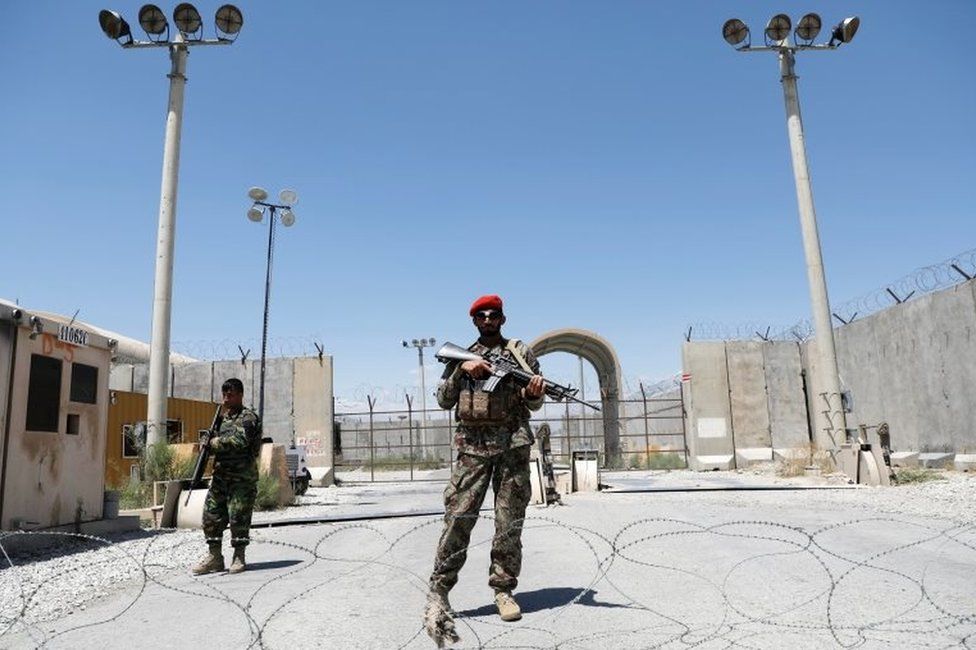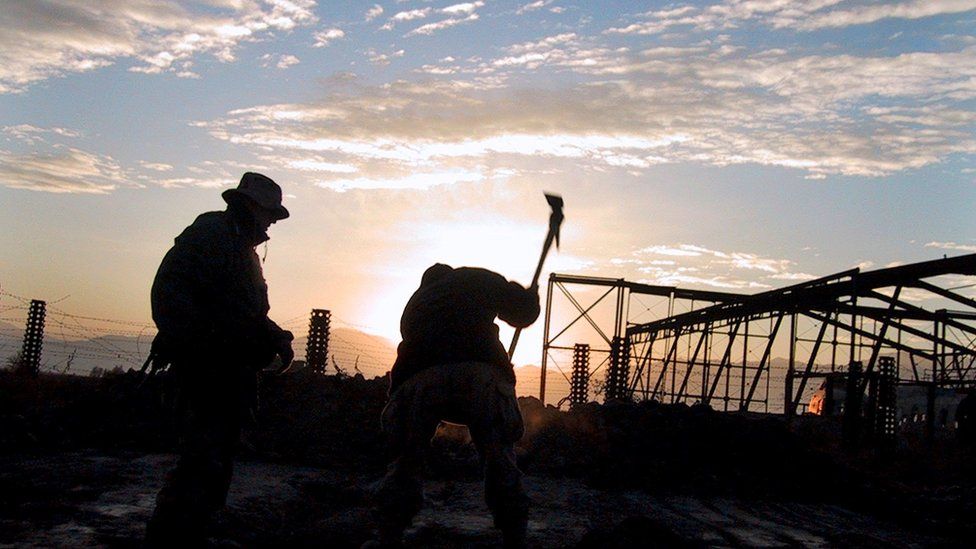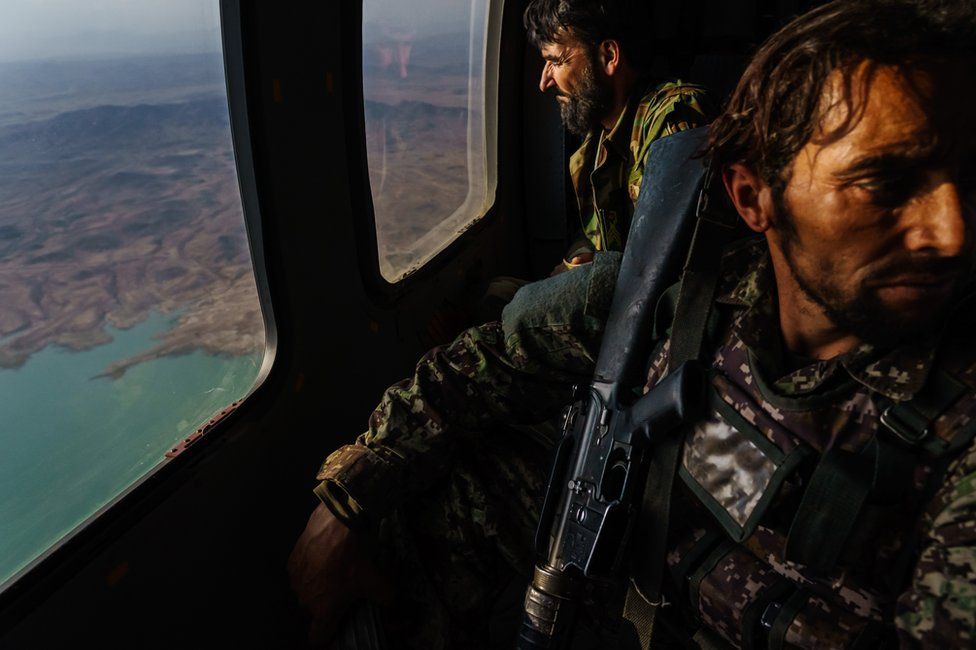Winning the Battles, Losing the War
"As soon as the first [IED] explosion kicked off we all had a gut feeling it was a bad one. Some of them were walking wounded. Some [British soldiers on a dawn patrol in Helmand Province, Afghanistan, July 2009] were helping each other walk back and others were literally in bits.""I don't want to say they've all died for nothing. We've lost a lot of people for a cause but when we totally pull out it will revert to exactly what it was like before.""Ultimately when the fighting stops you have a duty to rebuild and it doesn't feel like we have done that.""It's hard to put into words, but my life will never be the same."British Rifleman Peter Sherlock, C Company, 2nd Battalion, the Rifles, Sangin District, Afghanistan"We consider this withdrawal a positive step.""Afghans can get closer to stability and peace with the full withdrawal of foreign forces."Zabihullah Mujahid, Taliban spokesman"The Americans must leave Afghanistan and there would be peace in this country.""We are in a difficult situation. Most people have fled their districts and some districts have fallen.""Seven districts in Paktia province have fallen and are now under Taliban control."Javed Arman, Kabul resident
 |
| Afghan soldiers guarded Bagram on Friday Reuters |
A senior U.S. security official on condition of anonymity stated "All American soldiers and members of NATO forces have left the Bagram Air Base".
And the international community if it has any interest in the future of
Afghanistan, should be aware that the last foreign troops to leave will
as good as flick the switch to total darkness. After
20-in-retrospect-wasted years of scuffling with the Taliban in an effort
to push it back and out of contention to once again gain control of the
country, the U.S. troop pull=out leaving their main military base of
Bagram, effectively hands Afghanistan back to the Taliban.
Some U.S. forces will remain in Afghanistan as part of a "rational drawdown with allies",
it seems, and to protect the U.S. embassy in Kabul. But for how long?
The Taliban, set to regain control and oust the U.S.-backed government
of President Ashraf Ghani will have no tolerance for an ongoing presence
of U.S. troops for any reason, and the presence of an American embassy
in Kabul will be viewed as unhelpful, an irritant meant to be expunged.
It
was from Bagram air base that the air war and logistical support for
the Afghan mission was co-ordinated. Over 3,500 members of international
forces lost their lives in Afghanistan, answering their nations' call
to duty in support of their American allies in the wake of the 9/11
attacks in New York, Washington and Pennsylvania. The number of deaths
of allied troops exceeding the number of deaths resulting from the 9/11
attacks by close to 50%.
According to one Western diplomat located in Kabul, the U.S. and its NATO allies had "won many battles, but have lost the Afghan war",
as good a summation as any of the immense energy, finances and human
life the prosecution of the war against the Taliban and al-Qaeda cost
the international community. And to what avail? All the advances Afghan
society gained during those decades in equality for women, economic
support, health services, education for children including girls,
lessons in the rule of law and democratic action, lost.
New
York City firefighters arrived at Bagram surrounded by the Hindu Kush
mountains that sheltered Osama bin Laden from the search for justice by
bringing a primary terrorist before an American court of law, to
symbolically bury a piece of the World Trade Center there mere days
after the Taliban fled the oncoming allied forces in search of the
elusive Osama bin Laden. The "black site" detention centre was operated
out of Bagram air base.
 |
| A piece of World Trade Center rubble was buried in the frozen ground of the base in December 2001 Reuters |
The
base hosted a sprawling fortified encampment absorbing the huge
international military force, offering gyms and a cafe and fast-food
outlets; a touch of 'home' in an alien land under duress. The base, on
desertion, will become the official property of the Government of
Afghanistan. Eventually to be handed over to the Taliban. And that piece
of the World Trade Center will be trashed along with the memory of the
international soldiers that sequestered and operated out of for two
decades.
General Austin Miller, top U.S. commander in Afghanistan "still retains all t he capabilities and authorities to protect the force"
while a minuscule proportion of it remains stationed in Kabul. General
Miller informed journalists that civil war for Afghanistan was "certainly a path that can be visualized",
Taliban fighters swooping into districts while foreign troops departed.
Not only can it be 'visualized', it can also be expected, a brief
preliminary to total takedown of the Afghan government.
President
Biden evidently had no use for advice from his own generals hoping to
hang on until such time that a political agreement was reached between
the Taliban and the Kabul government of President Ashraf Ghani. He has
been hung out to dry, to twist in the wind of change, along with the
people of Afghanistan who realistically can 'visualize' their oncoming
future, a return to the dismal misery of the recent past under Taliban
Islamist rule.
The
Taliban have left their signature everywhere even as negotiations were
in process, lest people forget what they once experienced and will once
again undergo, by staging suicide attacks even in high-security areas in
Kabul, as well as anywhere else in the county where they deemed a
message was overdue. The death toll of Afghan soldiers and the national
police was another reminder that their days were numbered as well. Any
Afghans known to have been of assistance to the kafirs had best exile
themselves.
 |
| These wounded Afghan soldiers were rescued by helicopter north of Kandahar last month Getty Images |
"Afghans are going to have to decide their future, what they want",
President Ghani was advised last week by President Biden in Washington.
As if. In acknowledgment President Ghani responded that his job now was
to "manage the consequences"
of the U.S. withdrawal. The death knell of any vision of democracy in
the country, of peace and stability, of gains made by women and girls,
who can now expect they must be fully tented in burqas at all times; no
laughing, no music, no dancing, no employment, no life.
As
part of the agreement between the U.S. and the Taliban the withdrawal
gained the U.S. a promise from the Taliban leadership that international
terrorists will never again to permitted to operate from Afghan soil.
Islamic State is on Afghan soil, as is al-Qaeda, all in good health,
which makes three terrorist groups operating on Afghan soil, all of whom
do not regard the United States with any level of affection.
Oh
yes, the Taliban reiterated to the Americans their commitment to
negotiate with the Afghan government. In talks taking place in Doha,
Qatar, which have to the present made little progress, and will make
precisely no progress in recognition of the government of Afghanistan as
valid, since plans are that it will be forfeit the minute the all-clear
is given for the Taliban to take complete charge. Both pledges by the
Taliban to assuage the guilt of the U.S. over abandoning Afghanistan are
rubbish. And both parties know it is face-saving and self-serving.
"We
urge an end to violence, respect for the human rights of all Afghans
and serious negotiations in Doha so that a just and durable peace may be
achieved", stated the U.S. Embassy in Afghanistan,
giving assurance that the United States was firmly committed to provide
security assistance of $3 billion in 2022 to benefit the Afghan
government's security. The smokescreen of betrayal.
But
of course Afghanistan has an obligation to look after itself. It cannot
and should not be under the direct protective wings of foreign
militaries. Afghanistan has throughout its long history been invaded and
occupied, a centre of jockeying by world powers for control of trade
routes and entry to markets waiting to be conquered. Afghans have always
resisted occupation by foreign powers. Their future is occupation by
oppressive religious fundamentalist terrorists.
Labels: Afghanistan, Government of Afghanistan, NATO Allies, Taliban, U.S. Military, United States

<< Home